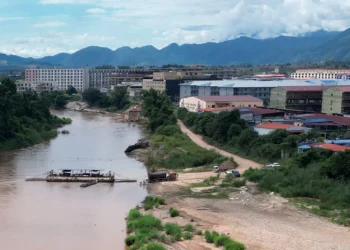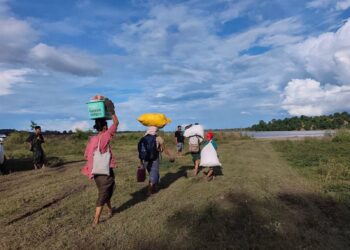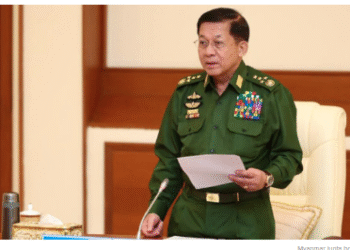When the junta unveiled its plan to forcibly conscript young men into the military, Ko Zin Khant’s mother panicked.
“My mother started telling me every day to go abroad because she doesn’t want me to join the military. When news spread online of people being abducted, she cried and begged me to go to Thailand,” said the 25-year-old, who asked to be identified by a pseudonym.
He quit his job at a printing press, where he was earning K400,000 per month (under US$100 at the market exchange rate), leaving Yangon’s Tarmwe Township for the outskirts of Bangkok in March.
Zin Khant arrived on a two-month tourist visa, paying K2 million in travel agent fees and airline tickets. It took him more than a month to find a job at a car workshop, where he makes 12,000 baht ($330) per month. It’s far more than his old salary in Myanmar, but his expenses in Thailand are also much higher.
“The salary is only enough for me to stay here; I can’t send any money back home,” he said, adding that he is working illegally and therefore faces extra costs.
“I don’t have a work permit so I need to extend my visa every month which costs around 3,000 baht,” he said. “If I get a work permit, I’ll be able to send money home but I don’t know when I will be able to do that.”
Regardless, he said his mother is “very happy” that he’s safe.
Facing widespread losses on the battlefield, the military activated a 2010 conscription law in February, saying it would draft 50,000 to 60,000 men aged between 18 and 35 in the first year. The resulting exodus of young people has created an acute labour shortage, battering an already fragile economy and fuelling child labour.
Thousands of young men like Zin Khant have quit from Yangon’s factories, workshops and other businesses, leaving their employers scrambling. One 40-year-old printing press owner in South Dagon Township said he’s gone from 50 employees to 30 since the conscription drive was announced.
“Before I could print about 1,000 books per month, but now I’m struggling to hit 700 because we have fewer workers,” he said.
Unable to complete orders, he admitted he’s turned to child labour, hiring five workers aged 16. When asked whether it was appropriate, he said: “We have no choice.”
“Some kids don’t go to school because they need to work. On the other hand, businesses are facing labour shortages,” he said, adding that printing press workers don’t need to be educated.
He said they also prefer to take young people because new workers have to be trained, and this training is a better investment if they stay longer.
The exodus
While many businesses have struggled since the 2021 military coup, a few sectors have actually benefitted from the economic downturn. The kyat has lost more than half its value, pushing many to instead put their savings in more stable assets like gold and property.
“Our company has had good business in the past few years,” said the owner of a construction company that builds apartment blocks in Yangon. “There are many people who want to build even though the price of construction materials has gone up.”
The company is typically hired by landowners but keeps half of the apartments in the finished building, which it can then sell or rent out. But after eight successful years in the industry, the military regime activated the conscription law.
“That’s where the trouble started for me,” he said.
At the time, the company was building five six-storey apartment buildings in Mayangone Township. Little by little, more than half of the 22-man workforce quit to go abroad, suspending construction on four of the projects.
“I have no way to solve it. I can’t easily find more workers. Other construction companies are also facing the same problem. The conscription law has ruined us,” the company owner said.
“We’re trying to finish the buildings under construction, but I can’t accept any new projects because I can’t guarantee anything to the clients,” he said. “I apologised to the landowners. I’m facing the most difficult time in my company’s existence.”
The garment industry is one of the most important sectors in Myanmar, providing jobs for hundreds of thousands of people, the large majority of whom are young women. It experienced rapid development in the decade before the coup, but since then has been hit by a steep rise in the cost of imported raw materials, import restrictions and electricity cuts. But while rock-bottom wages had kept the industry solvent, it has been seriously hobbled by labour shortages since March.
Rumours spread of civilians being press-ganged into the military from Yangon’s Shwepyithar, East and West Hlaing Tharyar and South Dagon townships, working class areas where most garment factories are located.
“Everyone was afraid,” said an HR manager at a 500-person garment factory in the Hlaing Tharyar industrial area. “Both men and women left their jobs; men more than women.”
Room to negotiate
The HR manager said many factories now don’t have enough workers to fulfil orders. “In particular, we have a shortage of skilled labourers,” she said.
Both the garment and construction industries have been forced to raise wages to retain employees but can’t raise them enough to attract skilled labourers.
The printing press owner in South Dagon said he pays his staff K250,000 per month, and also covers their food and shelter, but that’s the highest he can go.
“We cannot raise the salaries more than that because of the economic situation, so we’re still struggling to find skilled labour,” he said.
At the garment factories, rather than hiring replacements they are instead giving more work to the remaining employees. A worker who was previously expected to sew 30 pieces of cloth in an hour might now be expected to finish up to double that.
“They have to finish 600 pieces per day,” said Ma Ei, spokesperson for the Federation of General Workers Myanmar. “They need to work overtime if they don’t finish and don’t even get the weekend off.”
A garment worker at a factory in East Hlaing Tharyar Township said they are paid extra for the overtime work but have no choice in the matter.
“We have to work 10 hours every day,” she said. “Some weeks we even have to work on Sunday. We can’t say no.”
Ma Ei said now is the time for workers to leverage their increased value to the factories and demand higher wages.
“This is the best time to negotiate,” she said.
Women and children
Due to the labour shortage and remaining workers demanding higher wages, some business owners are increasingly turning to child labour.
Daw Thuzar, a 50-year-old mother of five, took out a loan of around K10 million two years ago to cover her husband’s medical bills after he had a stroke.
“The interest rate is 8 percent per month. We had no choice but to take out this loan. Now we have to pay almost K500,000 per month,” she said.
Daw Thuzar and her adult son were already working in factories but the family was still struggling to get by, so she took her 14-year-old daughter out of school to work.
“My daughter still wants to go to school,” she explained. “But if we can’t pay our debts, the whole family will suffer. That’s why I had to send her to the factory. If it were possible, I’d rather she stay in school.”
The 14-year-old works Monday through Saturday from 8am to 7pm at a backpack-sewing factory earning K350,000 per month.
Ma Ei said child labour in garment factories long precedes the coup – it’s even legal for 14-year-olds to work, but only up to four hours per day – but the problem has significantly worsened due to the economic downturn.
“Now they work 10 hours per day,” she said. “The main reason is poverty. Commodity prices are high. When there’s not enough income, children are forced to work.”
Meanwhile, women workers are increasingly following their male colleagues in fleeing Myanmar.
The conscription law allows the military to draft women aged 18 to 27. While the regime says it won’t do so yet, reports indicate it’s already informally forcibly recruiting women in some places.
Twenty-four-year-old Ma Yamin Htet, who works in online marketing from eastern Bago Region’s Taungoo Township, fears she might be next.
“The situation here is very bad. War is spreading all across the country and even women will have to serve in the military in the coming months,” she said.
Like many in Myanmar, she didn’t have a passport, so she applied for one in March in a bid to leave the country as soon as possible. But due to bureaucratic dysfunction and an overwhelming number of applicants, she won’t receive her passport until October at the earliest.
“If I wanted to get it sooner it would cost K4 million,” she said, referring to fees payable to brokers to cheat the system. “A lot of my friends are going to Thailand, but I want to go to Japan. But it’s not as easy to go to Japan … I need to pass a language exam.”
She said she expects it to cost K20 million to move to Japan – between employment agent fees, work training, airfare and accommodation – which her parents will need to borrow.
“I’ll pay it back once I make it abroad,” she said. “If it’s too difficult to go to Japan, I’ll go to Thailand. I have no other choice. We have no future here.”






